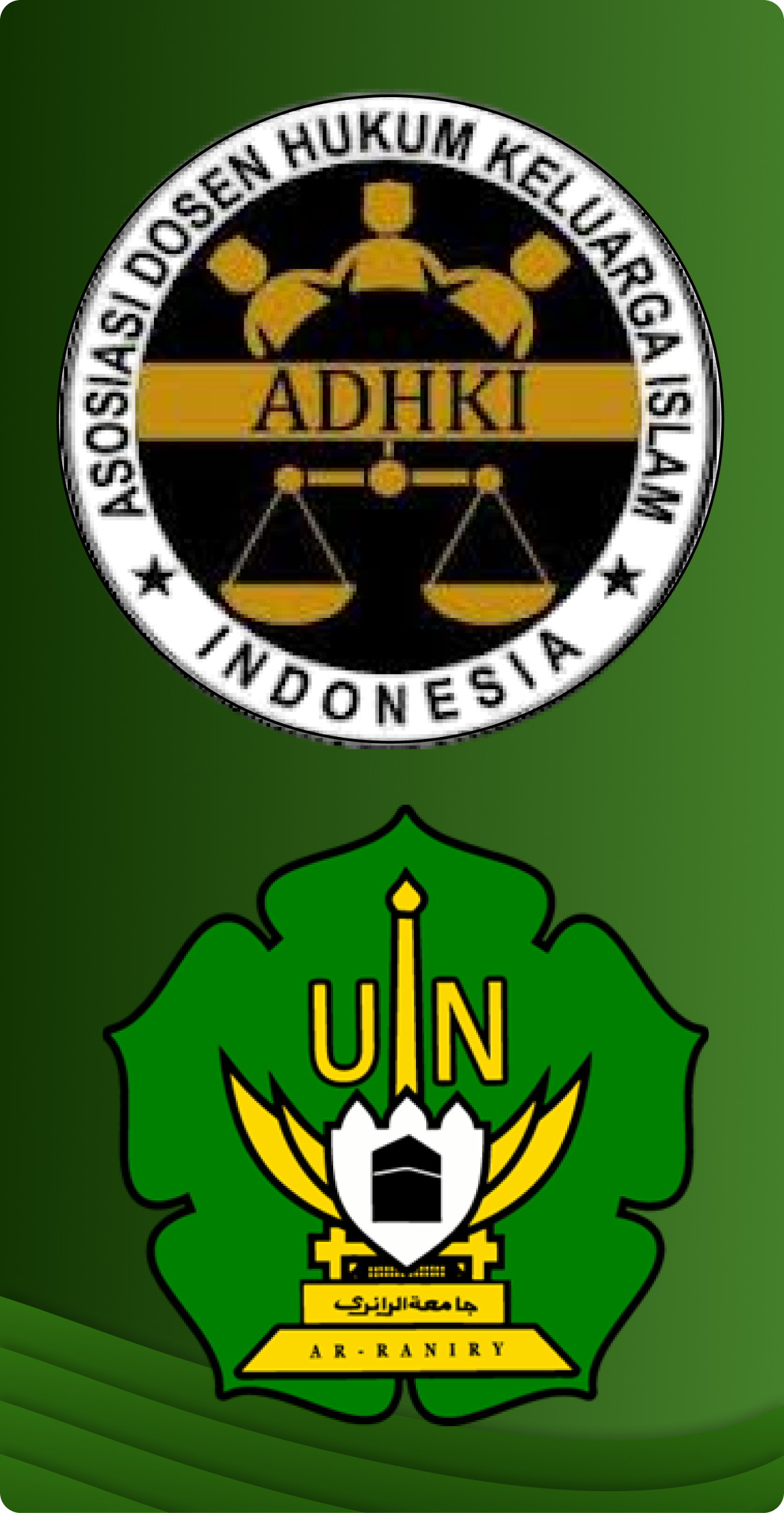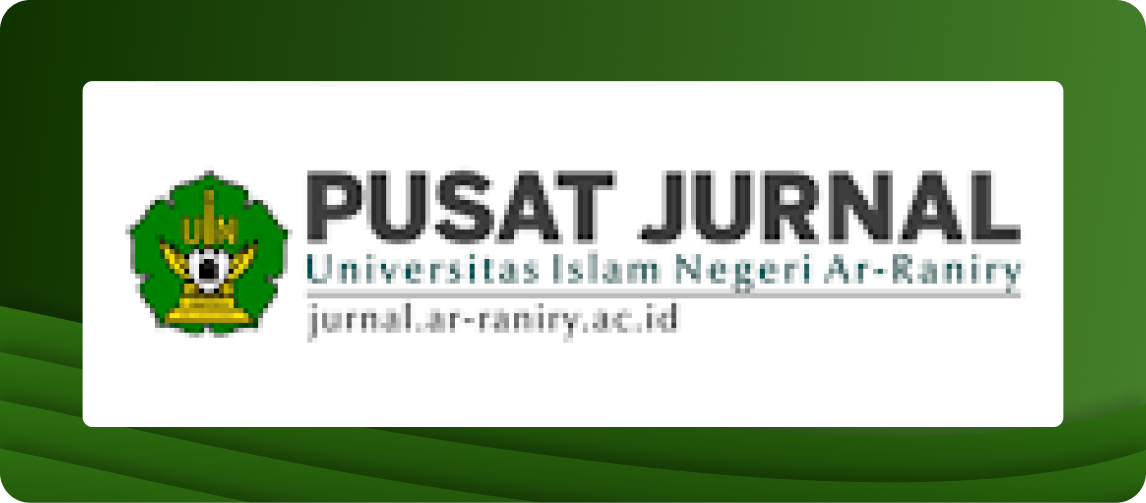The Legal Status and Juridical Authority of the Hakam in the Islamic Law
An Analysis of Syiqaq Cases in the Exegesis of Fakhruddin al-Razi
DOI:
https://doi.org/10.22373/9dvdmw79Keywords:
Hakam, Syiqaq, Tafsir Mafatih al-ghabib, Islamic LawAbstract
Household conflict (syiqaq) is a recurrent phenomenon with the potential to culminate in divorce, producing adverse consequences for spouses, children, and the broader social environment. Addressing syiqaq with fairness and wisdom is therefore an urgent necessity, particularly by recognizing the role of the hakam (mediator) as prescribed in Islamic teachings. This study examines the concept, legal status, qualifications, authority, and procedural role of the hakam as outlined in Fakhruddin al-Razi’s exegesis (Tafsir al-Razi). Employing a textual and content analysis methodology within a thematic (maudhu‘i) interpretative framework, the research analyzes relevant Qur'anic verses and al-Razi’s commentary concerning hakam in the context of syiqaq. Al-Razi underscores the hakam as a just mediator, typically drawn from among pious individuals or members of the disputing families. Two primary perspectives on the hakam's authority are identified: (1) possessing full decisional authority, and (2) serving solely as a non-binding intermediary. The mediation process involves structured dialogue, mutual consultation, and efforts to arrive at an optimal resolution, whether through reconciliation or separation. The hakam model remains pertinent in contemporary settings, provided it is adapted in accordance with the principles of justice and equity. Collaboration between state institutions and community actors is essential to enhancing the effectiveness of mediation practices and mitigating the incidence of divorce. Accordingly, mediation via the hakam represents a balanced and equitable approach to resolving familial disputes, safeguarding the integrity of the family unit as a foundational element of society.
References
Journal and Books
Ainol Yaqin, Moch. Cholid Wardi, and Achmad Mulyadi. “Actualization of Moderation in Reasoning at Ma’had Aly Salafiyah Syafi’iyah Sukorejo Situbondo and Its Influence on Istinbâth of Islamic Law.” AL-IHKAM: Jurnal Hukum & Pranata Sosial 17, no. 2 (2022). https://doi.org/10.19105/al-lhkam.v17i2.5962.
Al-Qardhawi, Yusuf. Kaifa Nata’amal Ma’a Al-Qur`an Al-’Azim. Kairo: Dar al-Shuruq, 1999.
Al-Razi, Imam Fakhr al-Din Muhammad. Tafsir Mafatih Al-Ghaib. 4th ed. Beirut: Dar al-Kutub al-Ilmiyah, 2013.
Al-Shabuni, Muhammad Ali. Shafwa Al-Tafasir. Beirut: Dar al-Fikr, 1991.
———. Tafsir Ayat Al-Ahkam Min Al-Qu`an. Beirut: Dar al-Kutub al-Ilmiyah, 1999.
Aminah, Siti, and Arif Sugitanata. “Genealogy and Reform of Islamic Family Law: Study of Islamic Marriage Law Products in Malaysia.” JIL: Journal of Islamic Law 3, no. 1 (2022). https://doi.org/10.24260/jil.v3i1.556.
Apriyanti Apriyanti, Uswatun Hasanah. “Nusyuz of Husband and Wife in the Maslahah Perspective.” Nurani: Jurnal Kajian Syari’ah Dan Masyarakat 25, no. 1 (2025). https://doi.org/https://doi.org/10.19109/nurani.v25i1.25328.
Auni, Luthfi, and Nidawati Nidawati. “The Semiotic Meaning and Philosophy of Symbols in the Gayo Ethnic Marriage Processions in Central Aceh.” Jurnal Ilmiah Peuradeun 11, no. 1 (2023). https://doi.org/10.26811/peuradeun.v11i1.811.
Azni Azni, Muhammad Hafis, Asril Amirul Zakariah, Adi Harmanto, Miftahuddin Miftahuddin, M. Ihsan. “Pseudo-Maṣlaḥah and Epistemological Failure in Marriage Dispensation at Indonesian Religious Courts.” Jurnal Ilmiah Peuradeun 13, no. 2 (2025). https://doi.org/https://doi.org/10.26811/peuradeun.v13i2.2047.
Barkah, Qodariah, Arne Huzaimah, Siti Rachmiyatun, Andriyani, and Zulmi Ramdani. “Abandonment of Women’s Rights in Child Marriage; An Islamic Law Perspective.” Al-Ihkam: Jurnal Hukum Dan Pranata Sosial 17, no. 2 (2022): 383–411. https://doi.org/10.19105/al-Ihkam.v17i2.6725.
Beddu, Muhammad Juni, Muhammad Iqbal Azhari, Fithri Mehdini Addieningrum, Andi Amma Ruhmah, Muhammad Zakir Husain, and Normadiah Daud. “Fresh Flour in The Perspective Of Religion, Social, and Culture in The Riau Islands Community.” Al-Risalah: Forum Kajian Hukum Dan Sosial Kemasyarakatan 24, no. 1 (2024). https://doi.org/10.30631/alrisalah.v24i1.1471.
Damiarto, Israt, Alfitri, and Moh Mahrus. “Konflik Suami Istri Perspektif Al Quran (Kajian Ayat Tematik Terkait Nusyuz Dan Syiqaq).” Jurnal Tana Mana 4, no. 2 (2023). https://doi.org/10.33648/jtm.v4i2.391.
Datumula, Sarfika. “Mediasi Dalam Penyelesaian Perkara Perceraian Di Luar Pengadilan.” Innovative: Journal Of Social Science Research 3, no. 2 (2023). https://doi.org/10.31004/innovative.v3i2.2090.
Devy, Soraya, Syamsul Bahri, Selamat Ariga, Muhammad Aslam Ahmad, Mumtazinur Buchary Budiman, and Yenny Sri Wahyuni. “The Role of Witness as Evidence in Divorce Cases at the Banda Aceh Syar’iyah Court.” Samarah: Jurnal Hukum Keluarga Dan Hukum Islam 5, no. 2 (2021). https://doi.org/10.22373/sjhk.v5i2.10879.
Eleanora, Fransiska Novita, and Dwi Atmoko. “Aktualisasi Sertifikasi Pranikah Dalam Meminimalisir Kekerasan Dalam Rumah Tangga.” Jurnal Hukum Sasana 7, no. 1 (2021). https://doi.org/10.31599/sasana.v7i1.477.
Fadhil, Ahmad. “Tafsir Al-Sayis Dan Al-Zuhayli Terhadap Ayat Nusyuz Dan Syiqaq Serta Dan Penyelesaiannya: Analisa Teologis Normatif, Psikologis, Dan Sosiologis.” Syaksia : Jurnal Hukum Perdata Islam 22, no. 2 (2021). https://doi.org/10.37035/syakhsia.v22i2.5536.
Fadli, Fadli, and Budi Juliandi. “Negosiasi Antara Hukum Positif Dengan Hukum Islam: Penetapan Wali Nikah Di Kantor Urusan Agama Idi Rayeuk, Aceh, Indonesia.” JIL: Journal of Islamic Law 2, no. 2 (2021). https://doi.org/10.24260/jil.v2i2.329.
Fawaid, Bahrul, and Fajar ainun Ridho. “Perceraian Yang Diakibatkan Oleh Pertengkaran (Syiqaq).” QISTIE 16, no. 1 (2023). https://doi.org/10.31942/jqi.v16i1.8408.
Harahap, M. Yahya. Kedudukan, Kewenangan Dan Acara Peradilan Agama. Jakarta: Pustaka Kartini, 2000.
Hasanudin, Oyo Sunaryo Mukhlas, Muhammad Farhan Bin Mat Noradin, Ending Solehudin, and Dedah Jubaedah. “Phenomena of Domestic Violence Against Women and Divorce in 2020-2022 in Indonesia: An Islamic Perspective.” Al-Manahij: Jurnal Kajian Hukum Islam 17, no. 2 (2023). https://doi.org/10.24090/mnh.v17i2.7686.
Hasse Jubba, Sudirman Sudirman, Suparto Iribaram, Wan Khairul Aiman bin Wan Mokhtar, and Rusdi Rasyid. “Compromise of Islam and Customary Practices in the Religious Practices of the Muslim Community in Papua: A Study of Maqāṣid Syarī’ah.” Ijtihad : Jurnal Wacana Hukum Islam Dan Kemanusiaan 24, no. 2 (2024). https://doi.org/10.18326/ijtihad.v24i2.305-330.
Hidayati, Tri Wahyu, Ulfah Susilawati, and Endang Sriani. “Dynamics of Family Fiqh: The Multiple Roles of Women in Realizing Family Resilience.” Ijtihad: Jurnal Wacana Hukum Islam Dan Kemanusiaan 22, no. 2 (2022). https://doi.org/10.18326/IJTIHAD.V22I2.219-238.
Huzaimah, Arne. “Menelaah Pelaksanaan Pengangkatan Hakam Pada Perkara Syiqaq Di Pengadilan Agama Indonesia Dan Mahkamah Syar’iyah Malaysia.” Nurani: Jurnal Kajian Syari’ah Dan Masyarakat 19, no. 1 (2019). https://doi.org/10.19109/nurani.v19i1.1940.
Indra, Gandi Liyorba, M. Yasin Al Arif, and Abdul Qodir Zaelani. “The Ideal Age For Marriage in The Compilation of Islamic Law (KHI) and Psychology.” Al-’Adalah 20, no. 1 (2023). https://doi.org/10.24042/adalah.v20i1.11598.
Ishak, Sufriadi. “Kemudharatan Tidak Harus Dihilangkan Dengan Kemudharatan.” Jurnal Al-Mizan: Jurnal Hukum Islam Dan Ekonomi Syariah 7(2) (2020): 117–26.
———. “Logika Dan Penalaran Dalam Ilmu Hukum Dan Ilmu Hukum Islam.” Jurnal Al-Mizan 10, no. 1 (2023). https://doi.org/10.54621/jiam.v10i1.581.
Ismail, Nurbazla, Abdul Basir Mohamad, and Nur Anis Nabilla Muhamad. “The Perspectives of Legal Practitioners on the Concept and Categories of Third Parties in the Household under Islamic Family Law in Malaysia.” El-Usrah 7, no. 2 (2024). https://doi.org/10.22373/ujhk.v7i2.26652.
Isman, and Yahya. “Istiqra’ Al-Ma’nāwī: A Multicultural Judicial Reasoning.” Ijtihad: Jurnal Wacana Hukum Islam Dan Kemanusiaan 22, no. 1 (2022). https://doi.org/10.18326/ijtihad.v22i1.95-116.
Jamal, Ridwan. “Penyelesaian Perkara Gugat Cerai Yang Di Dasarkan Atas Alasan Syiqaq (Studi Terhadap Proses Penyelesaian Gugat Cerai Syiqaq Di Pengadilan Agama Manado).” Jurnal Ilmiah Al-Syir’ah 13, no. 2 (2015). https://doi.org/10.30984/as.v13i2.178.
Jumarim, Ilyya Muhsin, and Muhammad Chairul Huda. “The Interplay of Fiqh, Adat, and State Marriage Law: Shaping Legal Consciousness of Sasak Women.” Al-Ihkam: Jurnal Hukum Dan Pranata Sosial 19, no. 2 (2024). https://doi.org/10.19105/al-lhkam.v19i1.10522.
Kamarusdiana, Kamarusdiana, Burhanudin Yusuf, Maman Rahman Hakim, and Harapandi Dahri. “Pre-Marital Education: Concepts and Regulations in Indonesia and Malaysia.” Al-Ahkam 32, no. 1 (2022). https://doi.org/10.21580/ahkam.2022.32.1.10709.
Karim Faiz, Abd., Zulfahmi AR, and Ahmad Izzuddin. “Between State Law and Islamic Law: The Practice of Divorce Outside the Situbondo Religious Courts, Indonesia.” JIL: Journal of Islamic Law 3, no. 2 (2022). https://doi.org/10.24260/jil.v3i2.848.
Kurniawan, Edi, Handesman Handesman, Rahmadi Rahmadi, and Khairun Najib. “Early Marriage, Human Rights, and the Living Fiqh: A Maqasid Al-Shariʻa Review.” Al-Risalah: Forum Kajian Hukum Dan Sosial Kemasyarakatan 20, no. 1 (2020). https://doi.org/10.30631/alrisalah.v20i1.565.
Lisnawati, Lisnawati, Sabarudin Ahmad, and Bariah Safrut. “Modernizing Divorce in Courts: How to Realize Justice in Diverse Geographical Conditions?” JURIS (Jurnal Ilmiah Syariah) 23, no. 2 (2024). https://doi.org/10.31958/juris.v23i2.11836.
Maloko, M. Tahir, Agus Indiyanto, Henky Fernando, and Yuniar Galuh Larasati. “Sompa Tanah in Makassar Bugis Customary Marriages: Legal, Religious, and Cultural Perspectives.” Jurnal Ilmiah Peuradeun 12, no. 3 (2024). https://doi.org/10.26811/peuradeun.v12i3.1309.
Mubarrak, Zahrul, and Muhammad Irfan Nur. “Wewenang Hakam Dalam Menyelesaikan Sengketa Rumah Tangga (Syiqaq) Dalam Fiqh Syafi’iyyah.” Jurnal Al-Nadhair 2, no. 2 (2023). https://doi.org/10.61433/alnadhair.v2i2.39.
Mulyo, Mufrod Teguh, Khoiruddin Nasution, Samin Batubara, Siti Musawwamah, and Raihanah Abdullah. “The Power of Husband-Wife Communication in Building Family Resilience and Preventing Divorce: A Study of Maṣlaḥah Mursalah.” Al-Manahij: Jurnal Kajian Hukum Islam 17, no. 2 (2023). https://doi.org/10.24090/mnh.v17i2.7651.
Munisah, Munisah, Ahmadi Hasan, Gusti Muzainah, and Yusuf Setyadi. “Barambangan: Dynamics and Challenges in Resolving Husband and Wife Disputes in the Banjar Community.” Syariah: Jurnal Hukum Dan Pemikiran 23, no. 1 (2023). https://doi.org/10.18592/sjhp.v23i1.10290.
Muslem, Muslem, and Siti Aminah Binti Abd Samat. “Mekanisme Majelis Tahkim Dalam Penyelesaian Sengketa Rumah Tangga (Analisis Enakmen Undang-Undang Keluarga Islam Nomor 2 Tahun 2003 Seksyen 48 Tentang Penambahan Kaedah-Kaedah Hakam Di Mahkamah Rendah Syariah Shah Alam, Selangor, Malaysia).” Media Syari’ah 20, no. 1 (2020). https://doi.org/10.22373/jms.v20i1.6502.
Nelli, Jumni, Afrizal Mansur, Zulkifli Zulkifli, Maghfirah Maghfirah, Sofia Hardani, and Izzah Nur Aida. “The Immorality of a Husband as the Cause of a Working Wife to File for Divorce Lawsuit in Indonesia.” JURIS (Jurnal Ilmiah Syariah) 22, no. 1 (2023). https://doi.org/10.31958/juris.v22i1.7392.
Nofiardi, Nofiardi. “Testimonium de Auditu Witness: Comparison of Maşlahah in the Settlement of Syiqaq in the Religious Court of the Border Regions.” Samarah 7, no. 2 (2023). https://doi.org/10.22373/sjhk.v7i2.11493.
Nurjanah, Siti, and Iffatin Nur. “Gender Fiqh: The Mobilization of Gender-Responsive Movements on Social Media.” Ijtihad: Jurnal Wacana Hukum Islam Dan Kemanusiaan 22, no. 1 (2022). https://doi.org/10.18326/ijtihad.v22i1.1-18.
Pagar, Pagar, Zainul Fuad, and Muhammad Muhammad. “Hakam Dan Mediasi Dalam Perkara Syiqāq Di Mahkamah Syar’iyah Bireuen Propinsi Aceh.” Al-Mashlahah Jurnal Hukum Islam Dan Pranata Sosial 10, no. 01 (2022). https://doi.org/10.30868/am.v10i01.2438.
Prasetyo, Anggi, and Ilyya Muhsin. “The Practice of Ṣiḥah Marriage among the Rifa’iyah Congregation in Sociological and Islamic Marriage Law Perspectives.” Al-’Adalah 20, no. 2 (2024). https://doi.org/10.24042/adalah.v20i2.19324.
Rahman, Muhammad Aulia, Roibin Roibin, and Nasrulloh Nasrulloh. “Dayak Ngaju Customary Fines in Pre-Marriage Agreement to Minimize Divorce in The Perspective of Maslahah Mursalah Ramadhan Al-Buthi.” El-Mashlahah 13, no. 1 (2023). https://doi.org/10.23971/el-mashlahah.v13i1.5623.
Rasyid, Arbanur, Jarudin Jarudin, Idris Saleh, and Rayendriani Fahmei Lubis. “Dynamics of Childless Marriage Through the Lens of Maqasid Al-Shari’a.” Jurnal Ilmiah Peuradeun 12, no. 2 (2024). https://doi.org/10.26811/peuradeun.v12i2.1182.
Rismayanti, Tiara, Danu Aris Setiyanto, and Muhammad Auzai. “Long-Distance Relationship Family Resilience Strategy and Its Relevance to the Development of Islamic Family Law in Indonesia.” JIL: Journal of Islamic Law 3, no. 2 (2022). https://doi.org/10.24260/jil.v3i2.842.
Rosyadi, Imran. Rekontruksi Epistemologi Hukum Keluarga Islam. Jakarta: Kencana, 2022.
Saiin, Asrizal, Firdaus Firdaus, Maulana Yusuf, Supani Supani, Muchimah Muchimah, and Anwar M. Radiamoda. “Walking Together: Dynamics of Muslim Wives Dual Role in Rural Areas Pursuing Career and Household Responsibilities.” El-Mashlahah 14, no. 1 (2024). https://doi.org/10.23971/el-mashlahah.v14i1.7827.
Syahr, Zulfia Hanum Alfi, Tumbur Palti D. Hutapea, Umma Farida, Dian Hafit Syaifullah, and Buyamin. “The Role of Indigenous Peoples, Social Workers, and the Syar’iyah Court in Diversion of Children Perpetrators of Jinayah.” Al-Manahij: Jurnal Kajian Hukum Islam 17, no. 1 (2023). https://doi.org/10.24090/mnh.v17i1.7349.
Syukrawati, Syukrawati, Imaro Sidqi, Siti Maymanatun Nisa, Zufriani Zufriani, and Doli Witro. “Post-Divorce Rights of Women and Children in Pekalongan City, Central Java: Challenges in Islamic Law Analysis.” Al-Ahkam 34, no. 1 (2024). https://doi.org/10.21580/ahkam.2024.34.1.20624.
Wirastri, Theresia Dyah, and Stijn Cornelis Van Huis. “The State of Indonesia’s Marriage Law: 50 Years of Statutory and Judicial Reforms.” AHKAM : Jurnal Ilmu Syariah 24, no. 2 (2024). https://doi.org/10.15408/ajis.v24i2.38424.
Zuhdi, Syaifuddin, Khudzaifah Dimyati, Kelik Wardiono, Rahma Shofia, and Abdul Hakim. “The Confiscation of Husbands’ Wealth as A Collateral for Post-Divorce Child Support: Perspective of Maqāṣid Al-Sharī’ah.” Samarah: Jurnal Hukum Keluarga Dan Hukum Islam 8, no. 2 (2024). https://doi.org/10.22373/sjhk.v8i2.17326.
Zulkarnain, Habib Iman Nurdin Sholeh, and Ahmad Zaenul Muttaqin. “Local Wisdom in Sebambangan Traditional Marriage Practices: A Maqāṣid Sharī’ah Perspective.” Ijtihad : Jurnal Wacana Hukum Islam Dan Kemanusiaan 24, no. 1 (2024). https://doi.org/10.18326/ijtihad.v24i1.119-137.
Downloads
Published
Versions
- 2025-06-30 (2)
- 2025-06-30 (1)
Issue
Section
License
Copyright (c) 2025 Sufriadi Ishak, Ahmad Nidal, Fazlon umar, Alauddin Abubakar, and Firman Nusir

This work is licensed under a Creative Commons Attribution-ShareAlike 4.0 International License.
Authors who publish in El-Usrah: Jurnal Hukum Keluarga agree to the following terms:
Authors retain copyright and grant the journal right of first publication with the work simultaneously licensed Attribution-ShareAlike 4.0 International (CC BY-SA 4.0) that allows others to share the work with an acknowledgment of the work's authorship and initial publication in this journal.
Authors are able to enter into separate, additional contractual arrangements for the non-exclusive distribution of the journal's published version of the work (e.g., post it to an institutional repository or publish it in a book), with an acknowledgment of its initial publication in this journal.
Authors are permitted and encouraged to post their work online (e.g., in institutional repositories or on their website) prior to and during the submission process, as it can lead to productive exchanges, as well as earlier and greater citation of published work. (See The Effect of Open Acces)

















